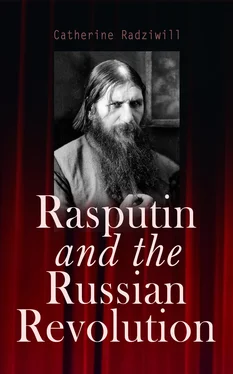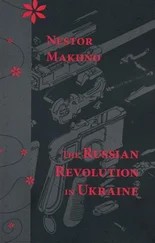My object in this study will be to show Rasputin for what he really was, and in retracing the different vicissitudes of his strange career, not to give way to the many exaggerations, which, in familiarising people abroad with his person and with his name, have made out of him something quite wonderful, and almost equal in power with the Czar himself. It is time to do away with such legends and to bring Rasputin back to his proper level—a very able and cunning, half-cultured peasant, who owed his successes only to the fanaticism of the few, and to the interest which many had in dissimulating themselves behind him, in order to bring their personal wishes to a successful end. It is not Rasputin who performed most of the actions put to his credit. It was those who influenced him, who pushed him forward and who, thanks to him, became both rich and powerful. He has disappeared. I wish we could be as sure that they have disappeared along with him.
Table of Contents
The beginning of the career of Gregory Rasputin is shrouded with a veil of deep mystery. He was a native of Siberia, of a small village in the government of Tobolsk, called Pokrovskoie. Some people relate that when quite a youth he was compromised in a crime which attracted some attention at the time—the murder of a rich merchant who was travelling from Omsk to Tobolsk to acquire from an inhabitant of the latter town some gold diggings, of which he wished to dispose. This merchant was known to carry a large sum of money, and as he never reached his destination inquiries were started. At last his body was found, with the head battered by blows, hidden in a ditch by the high road, together with that of the coachman who had driven him. The murderers were never discovered, but dark rumours concerning the participation of the youth Rasputin in the deed spread all over the village.
Whether it was the desire to put an end to them, or remorse for an action of which he knew himself to be guilty, it is difficult to say, but the fact remains that suddenly Gricha, as he was called, developed mystical tendencies and took to attending some religious meetings at which a certain wandering pilgrim used to preach. The latter used to go from place to place in Siberia predicting the end of the world and the advent of the dreaded day of Judgment when Christ would once again appear to demand from humanity an account of its various good or bad actions. For something like two years Rasputin followed him, until at last he began himself to assume the character of a lay preacher, to apply himself to the study of the Scriptures and to try to establish a sect of his own, the principles of which he exposed to his followers in these terms:
I am possessed of the Holy Spirit, and it is only through me that one can be saved. In order to do so, one must unite oneself with me in body and soul. Everything which proceeds from me is holy, and cleanses one from sin.
On the strength of this theory, Rasputin declared that he could do whatever he liked or wished. He surrounded himself with worshippers of both sexes, who believed that by a close union with him they could obtain their eternal salvation, together with divine forgiveness for any sins they might have committed during their previous existence.
Strange tales began to be related concerning the religious assemblies at which the new prophet presided. But, nevertheless, the whole village of Pokrovskoie, whither he had returned after his few years’ wanderings, accepted his teachings and submitted to his decrees with scarcely any exceptions. These unbelievers were looked upon askance by the majority of the inhabitants, who had succumbed to the “monk’s” power of fascination and hypnotism. It was with nothing else that Rasputin kept his “flock” subjugated. He introduced among them the cult of his own person, together with certain rites which he called “sacrifice with prayer.”
According to the narratives of some people, who out of curiosity had attended these ceremonies, this is how they proceeded: In the night, as soon as the first stars had become visible in the sky, Rasputin, with the help of his disciples, dragged some wood into a deep ditch dug for the purpose and lighted a huge bonfire. On a tripod placed in the midst of this fire was put a cup full of incense and different herbs, around which people began to dance, holding themselves by the hand all the while, and singing in a voice which became louder and louder as the wild exercise became more and more accelerated different hymns which always ended with the phrase: “Forgive us our sins, O Lord, forgive us our sins.”
* * *
The dance went on until people fell exhausted to the ground and groans and tears replaced the former singing. The fire died out slowly and, when darkness had become complete, the voice of Rasputin was heard calling upon his disciples to proceed to the sacrifice which God required them to perform. Then followed a scene of general orgy.
* * *
As one can see by this tale, the strange practices introduced by the seer, about whom people were already beginning to talk, differed in no way from those generally in use among the Khlysty, and, indeed, Rasputin made no secret of his allegiance to this particular form of heresy, in which, however, he had introduced a few alterations. For instance, he did not admit that the souls of his followers could be saved by a general prayer, but only thanks to one uttered in common with him, and by a complete submission to his will. Some persons have alleged that during the early wanderings of Rasputin he had gone as far as China and Thibet, and there learned some Buddhist practices, but this is hardly probable, as in that case his instruction would have been more developed than it was. It is far more likely that during his travels he had met with exiled sectarians belonging to the different persecuted religious Russian communities, of which there exist so many in the whole Oural region, and that they initiated him into some of their rites and customs. They also made him attentive to the hypnotic powers, which he most undoubtedly possessed, teaching him how to use them for his own benefit and advantage.
Very soon Rasputin found that Pokrovskoie was not a field wide enough for his energies, and he took to travelling, together with a crowd of disciples that followed him everywhere over the eastern and central Russian provinces. There he contrived to win every day new adherents to the doctrines in which free love figured so prominently. Among the towns where he obtained the most success can be mentioned those of Kazan, Saratoff, Kieff and Samara.
Concerning his doings in Kazan, people became informed through a letter which one of his victims addressed to the bishop of that diocese, Monsignor Feofane, who had shown at the beginning of Rasputin’s career a considerable interest in him and who had protected him with great success. In this letter, which later on found its way into the press, the following was said among other things:
“Your Reverence, I absolutely fail to understand how it is possible that you continue to this day to know and see Gregory Rasputin. He is Satan in person and the things which he does are worthy of those that the Antichrist alone is supposed to perform, and prove that the latter’s advent is at hand.”
The writer then proceeded to explain that Rasputin had completely subjugated the mind of her two daughters, one of whom was aged twenty, whilst the second had not yet attained her sixteenth year.
“One afternoon,” writes this unfortunate mother, “I met in the street, coming out of a bathhouse, Rasputin, together with my two girls. One must be a mother to understand the feelings which overpowered me at this sight. I could find no words to say, but remained standing motionless and silent before them. The prophet turned to me and slowly said: ‘Now you may feel at peace, the day of salvation has dawned for your daughters!’”
Читать дальше












